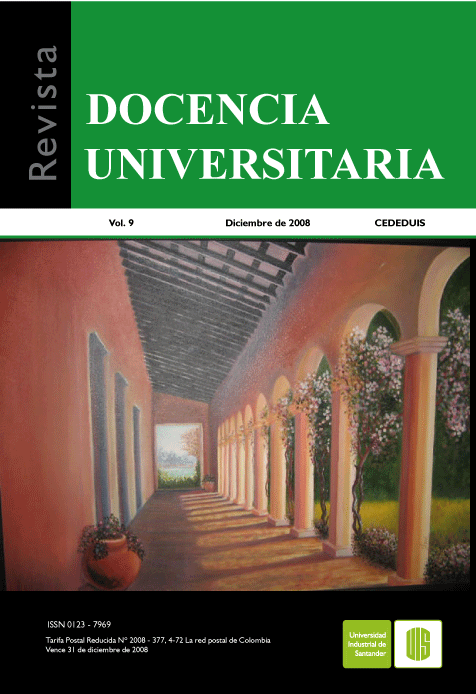Publicado 2008-08-12
Cómo citar
Resumen
La evaluación se constituye en uno de los aspectos importantes para estudiar el proceso de aprendizaje, lo cual supone abordar necesariamente todos los problemas fundamentales de la pedagogía. Objetivo: determinar la validez de constructo, consistencia interna y reproducibilidad de un formato de evaluación del proceso de aprendizaje de los estudiantes en las prácticas de enfermería. Metodología: Evaluación de tecnologías diagnósticas. A una muestra de 105 estudiantes de enfermería de la Universidad Industrial de Santander, se les realizó doble aplicación de un instrumento con 30 reactivos que indagaba aspectos sobre el aprendizaje, medidos en escala ordinal, según grado de acuerdo. Se calcularon límites de acuerdo para evaluar reproducibilidad, coeficiente de correlación. Resultados: El promedio de edad fue de 22+- 4 años, el 89.5% fueron mujeres. El análisis de componentes principales mostró 3 factores: "Formas o proceso de evaluación: autoevaluación y heteroevaluación", "Metodologías educativas o estrategias pedagógicas" y "Aspectos negativos de las metodologías". El análisis de varianza con género, edad y nivel sólo mostró diferencias significativas p
Palabras claves: evaluación, aprendizaje, prácticas enfermería, validez formato, reproducibilidad de los resultados.
EVALUATION PROCESS OF LEARNING FOR STUDENTS IN THE PRACTICE OF NURSING
SUMMARY
The evaluation is one of the important aspects for studying the learning process, which necessarily means tackling all the fundamental problems of pedagogy. Objective: to determine the construct validity, internal consistence and copying of an evaluation format of the process of learning from the students during infirmary practices. Methodology: Evaluation of diagnostics technologies. To a sample of 105 nursing students from of the University Industrial of Santander, it was done a double application of an instrument with 30 reagents that investigated learning
aspects, measured in ordinal scale, according to agreement degree. Agreement limits calculated to evaluate reproducibility, correlation coefficient. Results: The average age was 22+ - 4 years old, the 89.5% were women. The analysis of main components showed 3 factors: "Forms or process of evaluation: educative self assessment and heteroevaluation", "Educational Methodologies or pedagogical strategies" and "negative Aspects of the methodologies". The analysis of variance according to gender, age and level only showed significant differences p
Key words: evaluation, learning, practical nursing, validity of the tests, reproducibility of results, questionnaire, learning.
Descargas
Citas
- AGUILAR, E., LATORRE, G., SARMIENTO, E. (2004). La evaluación formativa y el aprendizaje colaborativo. Docencia Universitaria. CEDEDUIS, 5, 63- 70
- AUSUBEL, D., NOVAK, J., HANESIAN, H. (1986). Psicología educativa. 2 ed. México: Trillas.
- BALLESTER, M. et al. (2000). La evaluación como ayuda del aprendizaje. Barcelona: GRAO; 2000. p. 173.
- BENNER, Patricia. (1984). From novice to expert: Excellence and power in clinical nursing practice. California: Addison-Wesley, p. 3.
- BLAND, J.M., ALTMAN, D.G. (1986). Statistical Methods for Assessing Agreement Between two Methods of Clinical Measurement. Lancet, I, 307-10
- CHADWICK, C.B. y RIVERA, N. (1991). Evaluación formativa para el docente. Barcelona: Paidos.
- CHMURA, K.H. (1992). Evaluating Medical test. Sage Publications Inc. Newbury Park, California USA.
- DEAN, J., DEAN, D.A. (1997). Coloumbier D, Brebdel KA, Smith DC, Burton, AH et al. Epi Info 6.04c. A word processing, database, and statistic program for public health. Center for Disease Control and Prevention (Atlanta, USA), and World Health Organization (Geneva, Switzerland).
- GIMENO SACRISTÁN, J. (1995). et al. La evaluación su Teoría y su práctica. Madrid: Cooperativa Laboratorio Educativo;
- HERNÁNDEZ, R., FERNÁNDEZ, C., BAPTISTA, P. (1998). Metodología de la investigación. 2 ed. México: McGrawHill, p. 235.
- LAGE, A. (1995). Los desafíos del desarrollo: la actividad científica como eje de la formación del personal de salud. Educ.Med.Salud, v.29, n.3-4, p.243-256.
- LAST, J.M. (1989). Diccionario de epidemiología. Salvat Eds, p. 29.
- MACCARIO, B. citado por MOLNAR, Gabriel. Evaluación educativa. Disponible en:http://www.chasque.net/gamolnar/evaluacion%20educativa/ evaluacion.01.html
- NORMAN, G.R., STREINER, D.L. (1996). Bioestadística. Mosby /Doyma libros. Madrid España, p. 129-42
- OROZCO, L.C., CAMARGO, D. (1997). Evaluación de tecnologías diagnósticas. Biomédica, 17:321-4
- PINILLA, Elvinia. (2004). Credibilidad en los procesos de autoaprendizaje. Docencia Universitaria. Cededuis.
- PEI. (2000). Proyecto Educativo Institucional. Universidad Industrial de Santander, 27.
- RODRIGUEZ, E. (1994). Construcción y reconstrucción de la enseñanza y el aprendizaje. Rev. Pensamiento Educativo, Chile, v.15, p.9-10, dic.
- REPÚBLICA DE COLOMBIA. (1993). Ministerio de Salud. Resolución 8430, por la cual se establecen las normas éticas para la investigación en seres humanos.
- SCRIVEN, M. (1967). The Methodology of Evaluation. Chicago: Rand McNally
- STATA 8.0. (2003). STATA Corporation, Inc., College Station, Texas, USA; .
- TENHOUSE, L. (1984). Investigación y desarrollo del curriculum. Madrid: Morata

